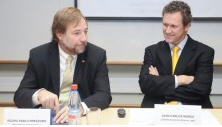There are of course quite a number of reasons, but one of them is NOT that we  do not have sufficient knowledge and experience in order to figure out and implement effectively a very large number of measures and policies, each of which one step at a time will draw us just one bit more close to our much needed goals. So that is definitely not the problem.
do not have sufficient knowledge and experience in order to figure out and implement effectively a very large number of measures and policies, each of which one step at a time will draw us just one bit more close to our much needed goals. So that is definitely not the problem.
Thursday, July 19, 2012
Why are we losing the war on sustainable transport, sustainable cities and sustainable lives?
Wednesday, July 18, 2012
"They are supposed to scream"
The acrimonious discussions and representations before the highest court of India in which the road lobby is currently doing its best to put an end to the concept of reserved lanes for more space-efficient public transport, with the single stroke of a pen, is something that all of us who are committed to the concept of sustainable and just transport can learn a few lessons. From the other side of the planet this article that appeared last week in Next American City  in its entirety below. It brings to mind the memorable words roared by former mayor Enrique Peñalosa a few years back on the subject of the ever-bitter struggle between the car lobby vs. more effective ways of getting around in his city: "Don't you understand Eric? they are supposed to scream".
in its entirety below. It brings to mind the memorable words roared by former mayor Enrique Peñalosa a few years back on the subject of the ever-bitter struggle between the car lobby vs. more effective ways of getting around in his city: "Don't you understand Eric? they are supposed to scream". 
Friday, July 13, 2012
John Whitelegg on "Health in the sustainable city"
 Some time back our very long time friend and associate, Professor of Sustainable Transportation and Sustainable Development John Whitelegg, was interviewed in Copenhagen and asked how changes in transport systems can lead to a vast improvement in quality of life. We need to move from a world filled with metal and concrete to a world of green spaces and clean air, he explained. Today, two years later, this short video has lost none of its validity or timeliness. Let's have a look.
Some time back our very long time friend and associate, Professor of Sustainable Transportation and Sustainable Development John Whitelegg, was interviewed in Copenhagen and asked how changes in transport systems can lead to a vast improvement in quality of life. We need to move from a world filled with metal and concrete to a world of green spaces and clean air, he explained. Today, two years later, this short video has lost none of its validity or timeliness. Let's have a look.
Thursday, July 12, 2012
No Parking, No Business 3: Walking and cycling perspectives
 Continuing our coverage of the open "No parking, No business" conversation, more on walkability impacts/local economic development impacts, this time from Todd Litman: selected references from the "Walkability" chapter of the Online TDM Encyclopedia of the Victoria Transport Policy Institute.
Continuing our coverage of the open "No parking, No business" conversation, more on walkability impacts/local economic development impacts, this time from Todd Litman: selected references from the "Walkability" chapter of the Online TDM Encyclopedia of the Victoria Transport Policy Institute.
Wednesday, July 11, 2012
No parking, no business 2: What happens in the store.
 On 23 June we asked the following open question to our readers "Has anyone out there ever run across a solid report or study showing that local businesses suffer financially when a zone is pedestrianized or made bike-accessible? Or that real estate prices take a nose dive when such improvements are made? Most of us here are familiar with the other side of this coin, but it occurred to me that this such critical references might be useful to us all, given that these local conflicts and claims come up time and time again in cities around the world."
On 23 June we asked the following open question to our readers "Has anyone out there ever run across a solid report or study showing that local businesses suffer financially when a zone is pedestrianized or made bike-accessible? Or that real estate prices take a nose dive when such improvements are made? Most of us here are familiar with the other side of this coin, but it occurred to me that this such critical references might be useful to us all, given that these local conflicts and claims come up time and time again in cities around the world."
Tuesday, July 10, 2012
Public Bikesharing in North America
NEW REPORT: Public bikesharing—the shared use of a bicycle fleet—is an  innovative transportation strategy that has recently emerged in major North American cities. Information technology (IT)-based bikesharing systems typically position bicycles throughout an urban environment, among a network of docking stations, for immediate access. Trips can be one-way, round-trip, or both, depending on the operator. Bikesharing can serve as both a first-and-last mile (connector to other modes) and a many-mile solution.
innovative transportation strategy that has recently emerged in major North American cities. Information technology (IT)-based bikesharing systems typically position bicycles throughout an urban environment, among a network of docking stations, for immediate access. Trips can be one-way, round-trip, or both, depending on the operator. Bikesharing can serve as both a first-and-last mile (connector to other modes) and a many-mile solution.
Monday, July 9, 2012
A quiet moment on India Streets
The vast editorial staff of India Streets is for the moment tied up with  professional obligations and educational projects, so things have slowed down for a while in these pages. No worries, since during this interim you will find a steady flow of useful information and discussions on our dedicated Facebook site here.
professional obligations and educational projects, so things have slowed down for a while in these pages. No worries, since during this interim you will find a steady flow of useful information and discussions on our dedicated Facebook site here.
Friday, July 6, 2012
SUTP May/June Newsletter
 The latest issue of the May/June SUTP newsletter has just been published and reports on the groups recent publications and activities, such as supporting training courses on transport in Malaysia, Bhutan, Sri Lanka and our contributions at Rio+20 Summit. You can pick it up freely here.
The latest issue of the May/June SUTP newsletter has just been published and reports on the groups recent publications and activities, such as supporting training courses on transport in Malaysia, Bhutan, Sri Lanka and our contributions at Rio+20 Summit. You can pick it up freely here.
Sunday, July 1, 2012
Transportation Innovation and Reform: The Path to Social Sustainability
As wise and balanced a summary as you will find of the fine art of dialogue and  engagement when it comes to the hard job of developing and integrating new transport arrangements into a space as varied and in many ways contradictory and conflicted as a 21st century city, in any part of the world. Bravo! With kind thanks to Christopher Zegras of MIT’s Department of Urban Studies and Planning, one of the conveners of this event, for sharing this with our readers. (You may also wish to check out the short note of conclusion of the editor.)
engagement when it comes to the hard job of developing and integrating new transport arrangements into a space as varied and in many ways contradictory and conflicted as a 21st century city, in any part of the world. Bravo! With kind thanks to Christopher Zegras of MIT’s Department of Urban Studies and Planning, one of the conveners of this event, for sharing this with our readers. (You may also wish to check out the short note of conclusion of the editor.)
Transportation Innovation and Reform: Finding the Way to Social Sustainability
As wise and balanced a summary as you will find of the fine art of dialogue and  engagement when it comes to the hard job of developing and integrating new transport arrangements into a space as varied and in many ways contradictory and conflicted as a 21st century city, in any part of the world. Bravo! With kind thanks to Christopher Zegras of MIT’s Department of Urban Studies and Planning, one of the conveners of this event, for sharing this with our readers. (You may also wish to check out the short note of conclusion of the editor.)
engagement when it comes to the hard job of developing and integrating new transport arrangements into a space as varied and in many ways contradictory and conflicted as a 21st century city, in any part of the world. Bravo! With kind thanks to Christopher Zegras of MIT’s Department of Urban Studies and Planning, one of the conveners of this event, for sharing this with our readers. (You may also wish to check out the short note of conclusion of the editor.)
--> Read on:


